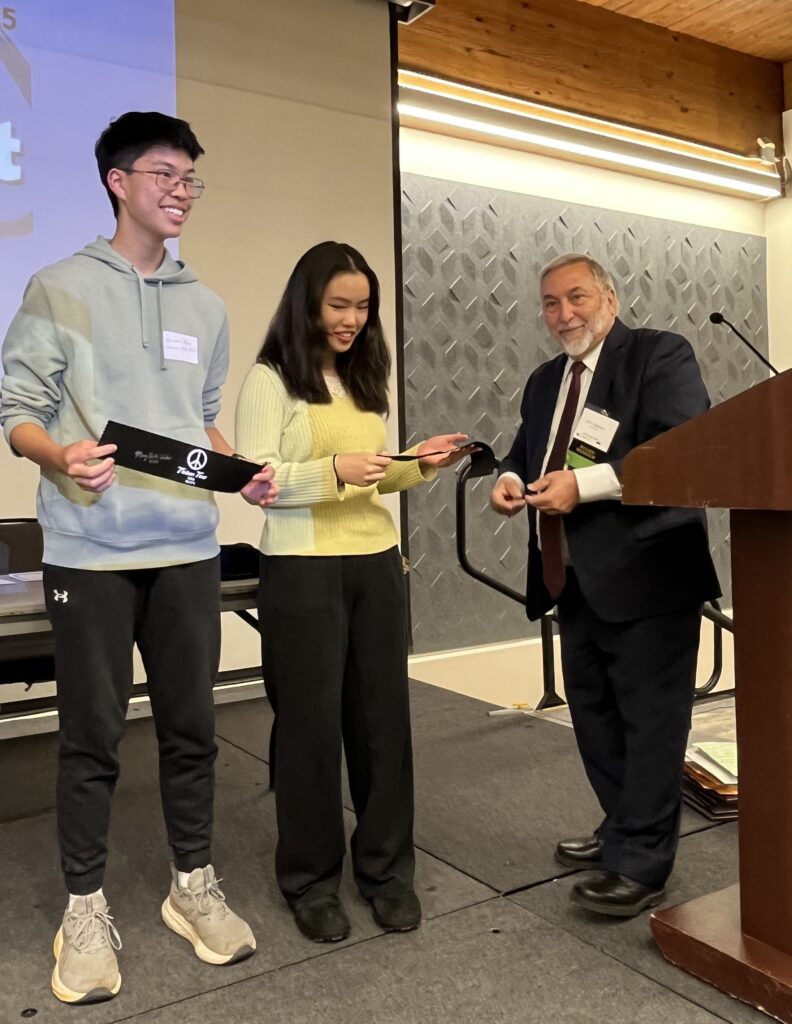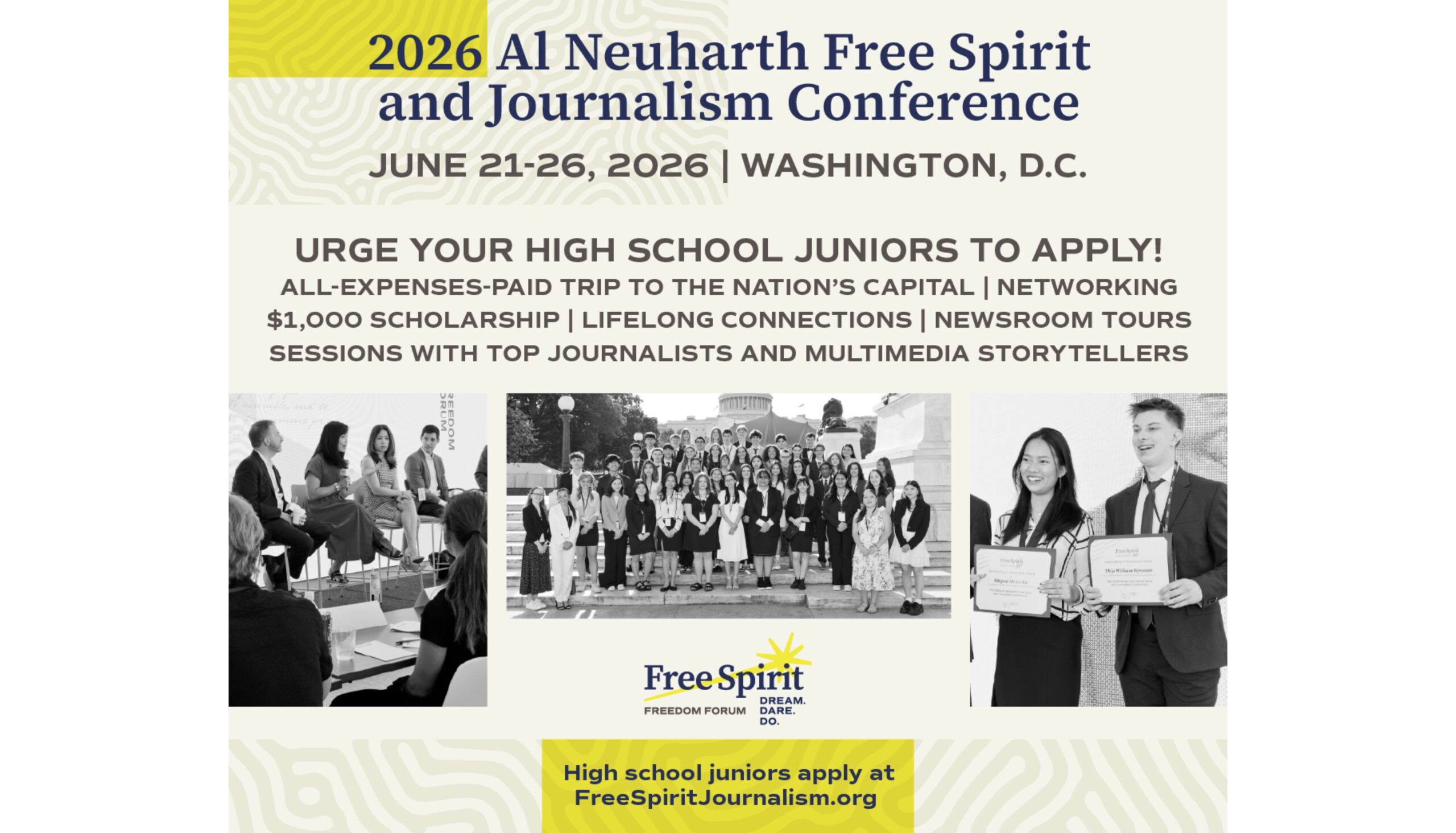
John Tagliareni presents signed Tinker Tour Arm Bands to Andrew Hum and Kim Hong at GSSPA’s Fall Conference at Rutgers University on October 27, 2025. Photo used with permission of Diana Day.
By Tom McHale
As I was setting up for my session on New Voices at last year’s Garden State Scholastic Press Association’s Fall Conference, the Rutgers University lecture-style room was full of students to see ABC 7 Morning News’ Traffic Anchor Heather O’Rourke. A stream of students headed toward the door, while others lined up to ask Ms. O’Rourke questions. She apologized for delaying my session, but I told her to take her time since the only ones left seated for my presentation were four students and an adviser eating lunch.
New Jersey passed New Voices back in December of 2021. Since then, we have struggled to educate students and advisers about the protections the law provides. The GSSPA has provided sessions, flyers, keynote speeches, and panels — mainly at our Fall Conferences which draw hundreds of students from dozens of schools across the state. In 2023, Keynote Speaker and JEA Yearbook Adviser of the Year Mike Simons had students take out their phones and showed them how to check whether their district had changed its scholastic publications policy to comply with the law.
I decided to include this in my session.
As the students checked their phones, two in the front asked me to review their district policy because they didn’t think it complied with the law based on the criteria I had presented. They were right.
I sent them a copy of my presentation and gave them my contact information. They also met with John Tagliareni, a founding board member of the GSSPA, who led the effort to pass New Voices in New Jersey.
This started Kim Hong and Andrew Hum (then 10th graders) on a year-long journey to change the policy and inform their staff and school community about student press rights.
Kim and Andrew talked with The Sting staff and advisers from Holmdel High School on the bus ride home. And while everyone was supportive, it was clear that they would be the ones to push their school board to make changes.
I caught up with Kim and Andrew at this year’s GSSPA Fall Conference. They admitted to being nervous at first.
“I think my family was really apprehensive about the entire thing,” Kim said.
Andrew had more support at home and was the more fearless of the two. He wanted to go to a Board meeting right away, but advisers Dave Gurney and Lynn Blustein encouraged their sophomore page editors to follow the chain of command.
In December of 2024, Kim and Andrew sent a letter to Holmdel Principal Michael-John Herits. They followed up with a lunchtime meeting.
“He was really eager to help us,” Andrew said. Herits forwarded the letter to the superintendent, who said that the district was currently revising its entire policy manual.
For weeks, they heard nothing. They focused on developing a sample policy based on the Student Press Law Center model and the NJ New Voices law criteria. In January, Superintendent Dr. J. Scott Cascone informed Kim and Andrew that the Board would be updating the policy.
But as the 2024-2025 school year drew to a close, the district still hadn’t changed its student publications policy as required by law. In fact, all school districts were required to adopt a New Voices-compliant policy by the 2022-2023 school year.
In late August, Kim and Andrew reached out to Superintendent Cascone again and asked to see a draft of what the board committee was working on. They sent the policy they developed, along with information from the SPLC, to the superintendent and the Board Policy Committee. Shortly after this, the committee finally sent Kim and Andrew a policy draft.
They immediately noticed the policy was still not compliant, so they reached out to John Tagliareni and SPLC Attorney Jonathan Gaston-Falk.
Armed with advice and specific suggestions for changes, they spoke at September’s Holmdel School District Board Meeting, urging the policy committee not to adopt the policy they had been sent. The Board passed the policy anyway, saying it would be quicker to amend later.
“I didn’t think they knew very much about the policy,” Andrew said. After the meeting, they sent an email to the board committee with a policy draft marked up with highlighted corrections and suggested revisions informed through emails with Gaston-Falk.
Things moved quickly from there. A revised policy that complies with the law passed at the October meeting.
“I don’t think that it was their intention to silence us,’ Andrew said. “But they did take a long time.”
At the GSSPA Fall Conference in October, John Tagliareni honored both of them at the Keynote session along with panelists and college journalists Alesandra Gonzales, Natalie Lahr, and Shea Vance. The panelists spoke about arrests and disciplinary actions they encountered for covering campus protests.
“[Kim and Andrew] worked so hard and stuck with it for an entire year,” Tagliareni said. “They stood up for the First Amendment, so we honored them the same way that we honored the panelists – with arm bands from Mary Beth Tinker.”
With this long process behind them, Kim and Andrew prepare to lead their publication as Co-Editors-in-Chief. In the past, the staff have had issues with self-censorship.
“We would think we can’t write that because we might get some kind of administrative retaliation, or we can’t write that because people might not like it,” Andrew said. “But my hope is that under the new policy, we won’t be scared to have a voice.”
Kim and Andrew have met with their staff about the policy and even wrote an Op-Ed for the first issue: SPEAK UP: If Two Students Can Do It, So Can You.
“I hope our staff writers will be willing to explore topics that are out of their comfort zone or events that might be risky,” Kim said.
Written By: Tom McHale



